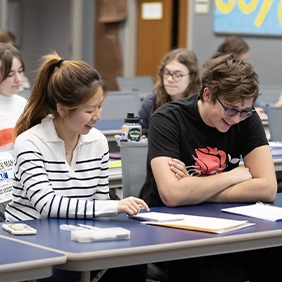Arriving in another country to live and study can come with questions, so we want to help make your transition as easy as possible.
Explore American culture so you can understand and adjust when you come across social and cultural differences. Getting to know the values, classroom dynamics, communication styles, and social customs that characterize life in the United States will help you build relationships and feel at home.

American Culture
American Values
Timeliness – The culture in the U.S. is very time-conscious. Americans greatly value punctuality and expect others to be mindful of appointments and agreed-upon meeting times. Generally, plan to be five minutes early for an appointment or meeting. Arriving at the exact meeting time is often considered too late. This also applies to your classes and assignment deadlines. Lateness is not tolerated and, in fact, can mean zero credit on an assignment, test, or quiz if you miss the deadline. Work hard to be on time!
Individualism – It is important to understand Americans' devotion to individualism. They are raised from a young age to consider themselves as separate individuals and to manage things on their own. Americans see themselves as being responsible for their own situations in life. They have not been trained to see themselves as members of a close-knit, tightly interdependent family, tribe, nation, or other group. At Cedarville University there is more of an interdependent family feeling than at most other institutions; we are part of God's family and therefore are brothers and sisters in Christ.
Privacy – Closely associated with the value they place on individualism is the importance Americans assign to privacy. Americans often assume that people need some "time to themselves" or some "time alone" to think about things or recover their spent energy. Some Americans may have difficulty understanding foreigners who always want to be with another person and dislike being alone.
Personal Space – Americans appreciate more personal space than other cultures. You might notice that if you stand a bit close, they will back away from you. This is not an indication that they don't like you, but rather an instinctive response. Be mindful that close proximity is not always welcome, but often will relax a bit once the other person gets to know you better. Typically, an arms-length distance between you and the other person is the comfortable and acceptable amount of space expected. Personal contact is also uncomfortable and unwelcome until a deeper level of friendship is shared.
Patriotism – You will see the American flag all over as you travel and live here in the U.S. The National Anthem is played at most sporting events, and there are various holidays throughout the year that show appreciation for our heritage. Americans deeply value the freedom that we have here and hold great respect for those who fought to defend our country and protect our freedom, as well as those who serve in the military today. It may seem odd at times, if you are not familiar with the culture. Please understand that these celebrations and shows of respect are not because Americans look down on other nations, but because Americans love their country!
Classroom Dynamics
Class Participation – In the United States, it is acceptable and even encouraged for students to ask questions and engage in discussion with the professor. This is not disrespectful; in fact, professors view participation in class discussions as a sign of interest in the subject matter.
Class Communication – Professors usually communicate course expectations through the syllabus, which you'll receive on the first day of class. The syllabus is your guide to each course, outlining the topics of study, the professor's policies, and the assignments and deadlines for the semester. You'll also want to check your Cedarville email often, as important announcements and information are communicated here.
Attendance – Make sure you come to class on time, and if you do arrive late, enter quietly and sit down. It is helpful to contact your professors ahead of time if you know you'll have to miss a class.
Assignments and Due Dates – Due dates are firm, so you'll need to turn in all your assignments by these dates to get full credit. Contact your professor ahead of time if you have an important reason for not being able to meet a deadline.
Learning in English – Especially during the beginning of your studies, it can seem exhausting and frustrating to speak and learn in English. Take every opportunity that you get to interact with American culture by speaking to American classmates, listening to books, podcasts, or music, and reading in English. These efforts will greatly help you understand your classmates and professors.
Resources for Help – Take the initiative in asking for help if you need it. Professors and classmates are willing to help if they know you are having some difficulty. Ask questions when you don't understand something, and meet with your professors during their office hours. Finally, explore the different types of academic support that Cedarville offers.
Communication Styles
Directness – Americans are generally more direct and open than most people from other countries. They don't typically hint at things, but rather will directly state what they think, need, like, or dislike. Because of this, they may not pick up easily on indirect communication, so do your best to be courteous and straightforward when addressing a need or question. Americans aren't taught to mask their emotions. Often, they will often convey their reactions through facial expressions and gestures. Their words, the tone of their voices, and their facial expressions will usually reveal what they are feeling. They do not think it is improper to display these feelings, at least within the limits. They are also much less concerned with avoiding embarrassment than most cultures are. To Americans, being "honest" is usually more important than preserving harmony in interpersonal relationships.
Greetings – A student once said, “I passed someone on the sidewalk and they asked, ‘How are you?’, but they didn’t stop, they just kept walking away…that’s so rude!” In America, friendly greetings are very typically phrased, “Hi! How are you?” This is simply a friendly greeting as someone walks by and not an indicator that the person wants to stop and have a long conversation. A proper response would be “I’m doing well, thanks!” or "Good, how are you?"
Depth of Conversation – Americans often have simple conversations of basic depth (talking about the weather, something they recently watched, a favorite snack, etc.) and that is how they begin to learn about others and decide whether a friendship might develop. Start with concrete facts and information and as you get to know one another, deeper information about feelings and personality will follow. Learn the art of casual conversation and watch friendships bloom!
Read more about the USA way of life on InternationalStudent.com.




















Social Life
Developing Friendships – Americans are fairly open and warm people who are quick to make new acquaintances, but they take their time to develop deeper friendships. They are cautious about revealing their feelings and emotions until they feel it is safe and comfortable. Friendships often begin with conversation, and at first, it may seem as if you’re talking about nothing of depth or importance. Give it time. Americans often want information first to determine if they are comfortable developing a relationship, but they value friendship highly and are very loyal. Conversation and time are the two most important ingredients in developing great friendships.
Dating – There are no universally accepted rules about dating in America. Traditionally, men have taken the initiative in asking women on dates, but this is changing as women are asserting their equal status in society. Common dating events include dinners, concerts, and movies. If you want to get to know someone better, you might ask the person to join you for coffee or lunch; these meetings can provide the beginning of an enduring friendship without the pressure of being a "date." Historically, the one who invited the other on the date would pay for any expenses, like the dinner check or the ticket price. It is becoming more common for people on a date to pay for his or her own expenses. If you plan to do this, make sure the other person understands this before you go out.
Women's Roles in Society – Women in America are generally less inhibited than women from other countries. They are not usually shy with Americans or international visitors. Their relaxed and more independent attitude may be misunderstood by people whose native culture is more restrictive of women's activities. It is not unusual, for example, for unmarried women to live by themselves, share living spaces with other single women, or to go to public places unescorted.
Pitching in Money – When a group of students gets together to go to the store or go out to eat, it is appropriate and thoughtful for everyone to split the cost of gas and reimburse the driver. It’s viewed as being considerate toward the person who owns and drives the car and will ensure that they don't feel others are taking advantage of them. Sometimes the driver may refuse the money, but it is appropriate to offer and be willing to help cover the cost.
Tipping – Tipping, or paying a gratuity, is expected when going to sit-down restaurants where you have a server, or when you get a haircut or manicure. Many of the people who work in these jobs work for reduced wages, so they depend on tips to help them earn enough for the day. Tipping is a way of thanking the server or provider for their good service. Most people will give a tip of 15%–20% of the value of the meal or service as a gratuity. For example, if your meal was $10, you would leave $1.50–$2.00 on the table for the server. If you are confused about tipping, ask a friend! Here are a few examples of where you might and might not tip: